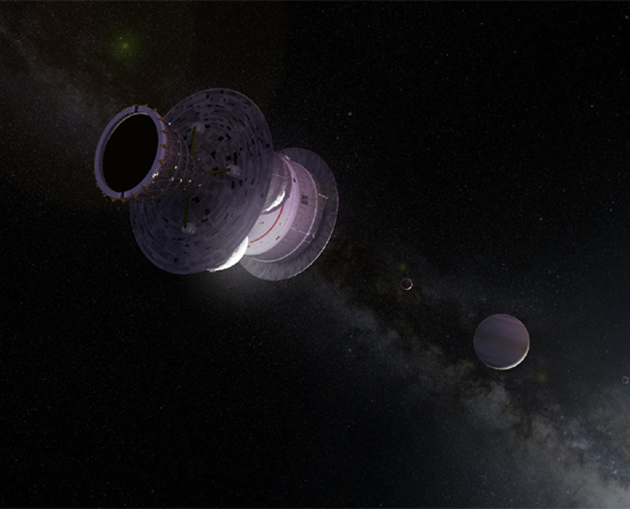
Long before any man-made object had ever slipped Earth’s surly bonds, humanity was already a space-faring species in the pages of science fiction stories. The sheer splendor of the Universe and the irresistible calling of the unknown had given rise to countless sweeping dramas set on faraway extraterrestrial settings, real or imagined, while also providing readers with insightful views, albeit often allegorical ones, of what humanity’s place in the Universe might be. It was these imaginative works of fiction that in turn often fuelled the passion of visionary thinkers and engineers, which ultimately led to the real-life opening of the final frontier itself.
One of the many subgenres that science fiction gave rise to became known as space opera. Characterised by storylines that were mostly epic in scope and often centered around an interplanetary romance, taking place amidst a fierce space warfare between sprawling alien civilizations, space operas were initially frowned upon as being second-class stories of substandard quality. During the second half of the 20th century, however, space operas were finally given a quality status—previously reserved for the subgenre of hard science fiction—and were eventually recognised as a serious example of literary fiction. Iconic television and cinematic series like Star Trek, Star Wars, and Battlestar Galactica, as well as animated series like Robotech and Legend of the Galactic Heroes, helped to further popularise the genre of space opera, to the point that for many it became synonymous with science fiction itself.
One of the latest literary examples of space opera is The Silver Ships series of novels, by American author Scott H. Jucha. Employing many of the genre’s tropes, the series is the sweeping story of the descendants of two Earth colony ships far into the future, who find themselves in a conflict with a mysterious new enemy. Within a few weeks of its release, the first book in the series became a #1 best-seller on Amazon, sequeled by Libre and two forthcoming novels. AmericaSpace had the chance to talk with Scott H. Jucha on a wide range of topics, including his own novels, science fiction in general, and the importance of space exploration for our world today.

Mr. Jucha, I’d like to thank you for taking time out of your schedule to talk with us. Would you like to introduce yourself to our readers and provide more details about your academic and literary background, as well as your inspiration for becoming a science fiction author?
What probably defines me more than my academic career, which consists of two bachelor degrees in Biology and Broadcast Communications, or the myriad of hats I’ve worn in my corporate career has been my personal passions. Since I was introduced to fiction novels at the age of thirteen, I have continually created stories in my head, stories rich in detail, and have yearned to write the stories I imagined. My first attempt at a fiction novel was in 1979, and the book was entitled The Lure, a modern crime drama. However, as a futurist, I enjoyed envisioning what societies humans might develop. Many of the dark and gloomy sci-fi stories that have been recently published were the impetus for me to finally write my own story … one of hope for humans. My other passion has been that of an environmental advocate. Having been born in Alaska, I have an ingrained love of wild, untouched wildernesses. As this planet’s dominant species, I believe mankind needs to care for this home we call Earth. In support of my passion, I have been a continuous contributor to NRDC, Sierra Club, and Greenpeace for thirty years. This year, I’ve added the Nature Conservancy in my wife’s name. Envisioning futures where humans care for the environment and invent technologies to support those desires has been enervating, to say the least. To borrow a famous movie quote: I have one word of advice for you … nanites!
Without giving away much of the story, would you like to tell us a bit more about the concept behind the Silver Ship series of books?
The Silver Ships was created as a trilogy. It contrasts two human cultures meeting for the first time after a millennium of separation due to dire circumstances. Despite their societal differences, and there are many, the humans work together, blending together over time. The story takes the approach that our differences are minor issues. It’s what we share in common—our hopes, dreams, love of family and the desire to live in peace—that are of greater importance. Mixed within the human story are the innovations of the future: implants allowing communication by thought, controllable nanotechnology, and artificial intelligence.
Many of the fascinating insights of cosmology and astrophysics have come as a result of decades’ worth of technological advances, which have also helped us tackle many problems that face our planet and global civilization. In this regard, does the study of the distant Universe ultimately result in better protecting and preserving our lives as well as the well-being of our home planet?
Understanding the distant Universe has multiple implications, some practical and some emotional. Astrophysicists, astronomers, physicists, and the like would benefit from knowledge that helped them understand the universe’s balance of matter and dark matter, energy and dark energy, and the universe’s continual expansion and cooling. The knowledge may act as a muse for the creation of alternative forms of energy production, possibly the ultimate target, fusion reactors. There could be no better technological leap for the human race. It would free us for the damaging processes of fossil fuel energy production.
Also, let’s not forget that our present day Earth and Moon were created by a massive collision of two celestial bodies. Moreover, we discovered an enormous meteorite impact off the Yucatan that scientists believe created a multi-year winter that killed off the dinosaurs. In our own written history, we have recorded huge meteor strikes such as those in Siberia. It would behoove us to study the universe, tracking asteroids entering and moving within our system and studying how these objects can be safely diffused if they head our way.
On an emotional note, questions exist in many minds as to the nature of the origin of the universe. Returning bits of data on this subject may help the public-at-large keep their eyes on the stars.
Cosmology has made large strides during the last couple of decades, to the point where not only scientists have began to probe the beginnings of the Universe, but can also ponder about its possible end. Even though these topics may seem as being very distant and inconsequential as seen from a human perspective, why do you think we should care as a race about the evolution and eventual fate of the Universe?
We should focus on our near future, the next decades. To date, we have staked our survival of this one small, blue-white marble we inhabit. If we wish to secure the human race’s future, we will need to expand into our Solar System and eventually the stars. The sooner we begin the sooner we secure our future.

Do you believe that in order to better manage our home planet in an environmentally friendly way, humanity’s expansion into and subsequent colonization of space is the only logical and practical solution? What do you think is the value of space exploration, and why should humanity continue to pursue it?
Space exploration-habitation and developing solutions to Earth’s problems are inextricably linked. Innovations for one area support the other. Space habitats will require efficient energy production, foregoing fossil fuels, and total recycling solutions. The Earth is also in need of these discoveries as well. By its very nature, space exploration will focus the efforts of a myriad of brilliant engineers and scientists to overcome the enormous challenges. As the scope of exploration expands to involve non-government organizations and commercial ventures, we will bring more resources to bear on these challenges. What is invented for space, we can use on Earth—alternate methods of energy production, recycling of inorganic material such as petrochemicals, and the filtering of heavy metals, pesticides, and deadly organic compounds from our environment.
In your Silver Ship series, you deal with interstellar colonisation. Yet, there’s a certain mindset that has arisen through the years—which is also exemplified by the so-called ‘Mundane Science Fiction Movement’—that space exploration is ultimately a useless distraction and even a threat to safeguarding our planet as well as the pristine environments of the rest of the Universe. Under this view, faster-than-light travel is nothing more than a form of adolescent escapism that will never come to pass. Is that just a sign of the technological and social pessimism that characterizes our culture today?
I’m of two opinions on the Mundane Science Fiction Movement’s premise. As someone focused on our environment, I believe space exploration and habitation throughout our system will yield inventions that will aid our planet’s resource management, recycling efficiency, and environmental cleanup. However, I believe there is nothing adverse in science fiction speculation … no holds barred. Who would have thought that sixty or seventy years ago, we would have landed on the Moon or be planning a mission to Mars (“Mars One”). It would be a mistake to underestimate human ingenuity.
As you have mentioned in your personal blog, one of the main themes in your Silver Ship book series is that the individual does matter and he or she can make choices to create a better world. Do you think that this is something that the world today needs to be reminded of more often?
The media constantly bombards us with negative stories. If we were to extrapolate the future from the predominance of these stories, we should expect the world’s demise in the near future, if not tomorrow. Having lived in and traveled to many other countries, I have found that, in general, people possess good hearts and are willing to extend a helping hand to those in need. I could wish that more people lived their lives as optimists and humanists, and more stories of selflessness and devotion to others made the news.
The Silver Ship series was originally conceived as a trilogy. With the fourth book now expected to hit bookshelves sometime in 2016, are you planning to expand the series even further in the future or begin something entirely different?
At this time, a fourth and a fifth book, the latter not yet announced, are planned as a pair that will detail a new adventure for our protagonists and extend the original trilogy. It appears the universe will not let Alex and his people rest for long.
And while delving through my 4-drawer cabinet of storylines that I’ve written over the past four and a half decades, I discovered an outline that is tailor-made for this universe and its timeline. It would be a new series based on a third Earth colony ship.
Mr. Jucha, I’d like to thank you again for taking the time to talk with us and to wish you every success for your writing plans!
It’s been my pleasure, and I thank you for your good wishes.
The author would like to thank Ms. Mallory Campoli from Smith Publicity Inc. for her overall kind assistance in conducting this interview.
Want to keep up-to-date with all things space? Be sure to “Like” AmericaSpace on Facebook and follow us on Twitter: @AmericaSpace





